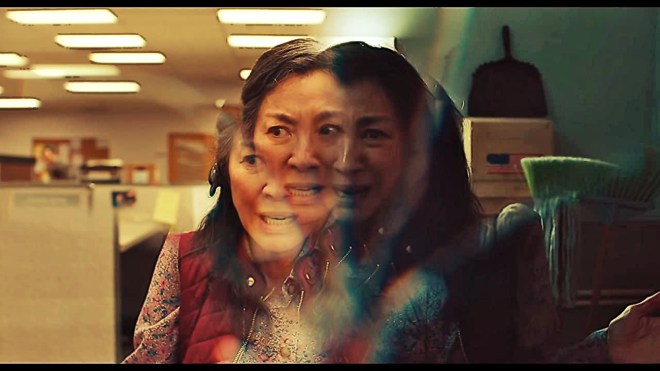
Everything Everwhere All At Once, starring Michelle Yeoh, directed by the Daniels duo, starts with the co-owner of a tanking laundromat sitting down to try doing her taxes, and ends 139 minutes later with the Universal Triumph of Love and Healing, best as I can render into words. In between we learn everything, for a necessarily-limited-to-139-minutes sense of everything, but fear not: you get an apocalypse fulfilling the literary sense of that word and coming close to fulfilling the street sense of that word. Shit blows up. But with revelation.
Actually, that literally-apocalyptic sense may be limited, because that sense can include a revelation of the future. What we learn as Michelle Yeoh learns, is that any concept of future becomes muddied by an infinite number of presents, each branched off from and branching to others. A crack, the late Leonard Cohen famously sang, is how the light gets in (to anything); here, every event down to a delayed blink or a speeded heartbeat, throws out another arm, to another existence. Thusly the cracks and pocks form a lattice—in the structural sense. Folly to ask how this happened or why. Tough enough reaching out a feeble human hand to it.

Michelle Yeoh has to learn the worst, and then move through the worst, of what the lattice has to offer, and some of it concerns the worst of her daughter (Stephanie Hsu), who interdimensionally manifests the worst that any parent can fear, about a child. She does this in part by changing outfits about every twenty seconds, all of them roughly equally finely-detailed. I hadn’t sunk into discombobulation like this since the famous likes of El Topo, Eraserhead, or Performance, and I used to wonder how bolder souls than my own, watched while tripping on psychedelics. The only clue I ever developed: Maybe getting that high forces one to surrender, not fight. Whatever it is—everything, everywhere, something never conceived of in any history—you just accept. That’s what I had to do here and take it straight to boot.
I don’t think you need to be high to follow along here, though; though you may have to watch way more than once to process it properly. And it ends, after all—after martial arts, monsters, existentialism, heroism, and a concentrated bastion of nihilism disguised as a tasty pastry—with the Universal Triumph of Love and Healing. Everyone in the audience filed out into this universe; as mundane travelers on the lattice, we have little choice.
But I confess, I just love happy endings.

